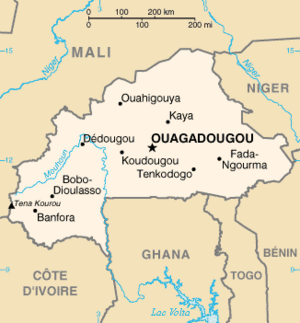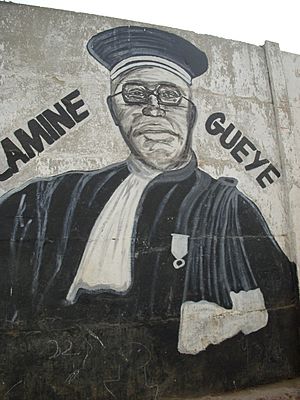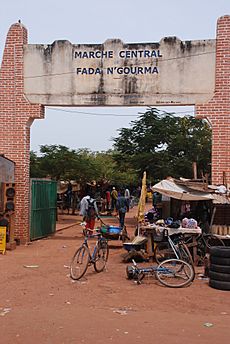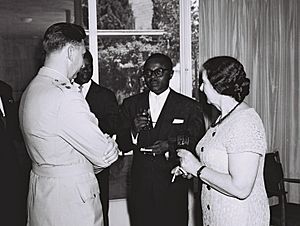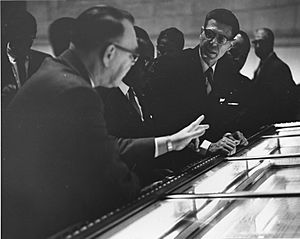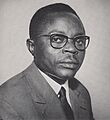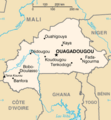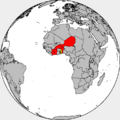Maurice Yaméogo facts for kids
Quick facts for kids
Maurice Nawalagmba Yaméogo
|
|
|---|---|
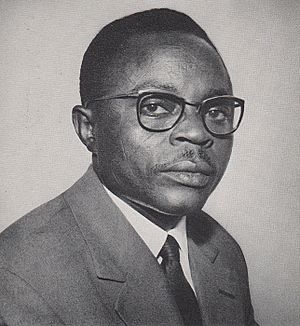
Yaméogo in 1960
|
|
| 1st President of Upper Volta | |
| In office 5 August 1960 – 3 January 1966 |
|
| Preceded by | None (position first established) |
| Succeeded by | Sangoulé Lamizana |
| Personal details | |
| Born | 31 December 1921 Koudougou, Upper Volta (now Burkina Faso) |
| Died | 15 September 1993 (aged 71) Ouagadougou, Burkina Faso |
| Nationality | Upper Voltian |
| Political party | Union Démocratique Voltaïque |
| Spouses | Felicité Zagré (d. 1998) Suzanne de Monaco Jeanette |
Maurice Yaméogo (born December 31, 1921 – died September 15, 1993) was an important leader in the history of Burkina Faso. He was the first President of the Republic of Upper Volta, which is what Burkina Faso was called back then. He served as president from 1959 until 1966.
Maurice Yaméogo was a key figure when Upper Volta gained its independence. He started working in the government in 1946. He was a very good speaker, which helped him become well-known in politics. In 1957, he joined the government as the minister for agriculture. Later, he became the second-in-command, handling internal affairs. This role allowed him to take over as interim leader when the previous head of government, Ouezzin Coulibaly, passed away in 1958.
After Upper Volta became a republic in December 1958, Yaméogo made a big decision. He chose for Upper Volta to be fully independent, rather than joining a larger federation of countries. He also worked to remove all political opposition. He created a one-party system, meaning only his party was allowed. This made Upper Volta a country with a single powerful leader even before it officially became independent on August 5, 1960.
In terms of foreign policy, Yaméogo looked up to Félix Houphouët-Boigny, the President of Côte d'Ivoire. Houphouët-Boigny was his closest friend and ally. However, Yaméogo's government faced problems due to financial issues and accusations of corruption. On January 3, 1966, his government was overthrown by peaceful protests. These protests were organized by workers' unions, traditional leaders, and religious groups. Maurice Yaméogo passed away in 1993, after his reputation was restored by President Blaise Compaoré.
Contents
Early Life and Education
Maurice Yaméogo was born on December 31, 1921, in Koudougou, a town in what is now Burkina Faso. He had a twin sister. His parents were farmers from the Mossi people, and they followed traditional beliefs. They named him Naoua Laguemba, which means "he comes to unite them."
From a young age, Maurice was interested in Christianity. He was baptized in 1929 and was given the name Maurice. After this, he adopted the name Maurice Yaméogo. He hoped to become a priest.
He attended the Minor Seminary of Pabré, a very respected school. Many future leaders of Upper Volta studied there. However, Maurice was also interested in women and parties. He left the seminary in 1939 without finishing his studies to become a priest.
Starting a Career
Even though he didn't graduate from the seminary, Maurice's education helped him get a job with the French Colonial Administration. This was a good job that brought him success and respect. He married Félicité Zagré, an educated woman from Koudougou. They were seen as a modern couple in their town.
During World War II, Yaméogo was sent to Abidjan in Côte d'Ivoire. He saw some unfair practices there, like people illegally forcing workers onto large farms. He also worked as a clerk in Upper Volta. Later, he became a leader in a workers' union, the CFTC, and then its vice-president for Upper Volta.
Early Steps in Politics
After the war, Yaméogo was elected as a general councilor for Koudougou in 1946. At that time, Upper Volta was divided among other countries. People wanted Upper Volta to be restored. Yaméogo joined the efforts to bring Upper Volta back. When a key leader, Philippe Zinda Kaboré, died, Yaméogo tried to take his place as a political figure.
On September 4, 1947, Upper Volta was restored to its original borders. Yaméogo became part of the new Territorial Assembly. He joined a political party called the Voltaic Union (UV).
A Regional Leader (1948–1952)
In 1948, Maurice Yaméogo was elected as a Grand Counsellor for French West Africa (AOF) in Dakar. This was a big achievement for someone so young. He became a respected figure, and his family was proud.
While in Dakar, Yaméogo became closer to the African Democratic Assembly (RDA) party. However, his political career faced some challenges in the early 1950s.
Political Setbacks (1952–1957)
Yaméogo faced more electoral losses in 1952. He returned to his job as a shipping clerk. He was even moved to a different town, Djibo, possibly because of his connections to the RDA, which the governor disliked.
Less than a year later, he returned to Ouagadougou. He tried to restart his political career by rejoining the Voltaic Union (UV). He also became a joint-secretary for a Christian workers' union.
The UV party later split into different groups. Yaméogo tried to form his own political group, but it wasn't successful. He also lost elections in 1956 and failed to get a high-ranking job in the city government.
Minister of Upper Volta (1957–1958)
In 1956, some parties merged to form the United Democratic Party (PDU). However, Yaméogo joined a new party called the Voltaic Democratic Movement (MDV) in 1956. In the 1957 elections, Yaméogo's MDV party won a surprising victory in Koudougou.
These elections led to a new local government. The PDU leader, Ouezzin Coulibaly, formed a coalition government. Maurice Yaméogo became the Minister of Agriculture.
Soon, there were disagreements within the government. Some ministers left the coalition. Yaméogo found himself in the opposition. However, in January 1958, Coulibaly convinced Yaméogo and his allies to rejoin the government. Yaméogo was promoted to the important role of Minister of the Interior. When Ouezzin Coulibaly died in September 1958, Maurice Yaméogo became the acting head of government.
President of Upper Volta (1958–1966)
Building His Power
After the people of Upper Volta voted to become more independent in 1958, the assembly met to choose a new leader. Maurice Yaméogo was elected as the president of the council on October 20, 1958.
Removing Political Rivals
Yaméogo worked to remove any opposition in the assembly. He formed a temporary unity government, but then used his power to dissolve the assembly in February 1959. New elections were held, and his party, the UDV-RDA, won most of the seats.
He continued to strengthen his position. He removed key opponents from his party and even dissolved the city council of Ouagadougou, which was led by a rival. No one seemed able to stand against "Monsieur Maurice." By late 1959, all parliamentary opposition had ended. On December 11, 1959, Yaméogo was elected as the first President of the Republic of Upper Volta without anyone opposing him.
Creating a One-Party System
Yaméogo quickly worked to establish a one-party system. He banned new political parties that tried to form. He even arrested some opponents who criticized his government. By the time Upper Volta gained full independence on August 5, 1960, all forms of opposition had been silenced.
A new constitution was approved in November 1960, giving Yaméogo even more power. He became a very strong leader. He sometimes sent his main opponents to work as ambassadors in other countries to keep them out of the way. Some political prisoners were released if they promised to support his government.
Concerns and Changes in Government
Yaméogo became more worried about plots against him after the president of neighboring Togo was killed in a coup in 1963. He had some people arrested, including his own cousin, Denis Yaméogo, who was the interior minister. This showed how unstable his government was, with many ministers being appointed or removed based on his decisions.
Yaméogo was also known for his lavish lifestyle, which included expensive trips and luxury items for his family. Meanwhile, he wanted to control workers' unions. He made a law in 1964 that forced all unions to join one national union, or they would be shut down.
Maurice Yaméogo became the focus of a cult of personality, meaning he was widely praised and celebrated, even appearing on stamps. He was the only candidate in the 1965 presidential election and was reelected with almost all the votes. His party also won all seats in the parliamentary and municipal elections.
Foreign Relations
Changing Views on the Mali Federation (1958–1959)
After becoming president, Yaméogo had to decide whether Upper Volta would join the Mali Federation. At first, he seemed unsure, even though many in Upper Volta supported it. However, he later changed his mind. He skillfully got himself elected vice-president of the Federal Assembly in Dakar.
He then asked the Voltaic Assembly to approve the federal constitution. Even though they did, Yaméogo used a supposed threat to gain more emergency powers. He then used these powers to get the assembly to approve a new constitution that pulled Upper Volta out of the federation. He also held a referendum, and the people supported his decision. In May 1959, Yaméogo helped create the Conseil de l'Entente, an organization that was against the Mali Federation.
Strained Relations with Côte d'Ivoire and France (1960-1961)
Yaméogo and Félix Houphouët-Boigny of Côte d'Ivoire had some disagreements, especially over money from customs. Yaméogo also refused to sign defense agreements that Houphouët-Boigny had negotiated with France. This hurt relations with both Côte d'Ivoire and France. Yaméogo even expelled the French High Commissioner, accusing him of plotting.
Yaméogo wanted Upper Volta to be more independent. He signed a military assistance agreement with France alone and demanded that France hand over its military base in Bobo-Dioulasso to the new Voltaic Armed Forces.
Connecting with Other African Nations (1961–1962)
Maurice Yaméogo was against communism. He helped create groups of "moderate" African leaders. In 1961, he was the first African head of state to visit Israel, where he signed a friendship treaty.
He also tried to build relationships with leaders from other groups, like Ahmed Sékou Touré of Guinea and Modibo Keïta of Mali. He especially wanted good relations with Kwame Nkrumah of Ghana. They even agreed to a customs union. Yaméogo hoped this would help Upper Volta get aid from America and reduce France's economic control. However, this friendship didn't last long, and relations with Ghana worsened due to border disputes.
Returning to Côte d'Ivoire's Influence (1962–1966)
Yaméogo eventually returned to being a strong supporter of Félix Houphouët-Boigny. He publicly defended Houphouët-Boigny against criticism from other African leaders.
Relations with France also improved, and new military agreements were signed in 1964.
In 1965, Yaméogo was the first African head of state invited to the White House by President Lyndon Johnson. This was a big honor. He used this opportunity to ask for financial aid for Upper Volta and other allied countries. He returned with a lot of money, which he used for his election campaign.
Yaméogo and Houphouët-Boigny also worked on a plan for citizens of both countries to have dual nationality. However, this plan was dropped after Yaméogo left office.
In 1965, Yaméogo married Suzanne de Monaco. Félix Houphouët-Boigny and Hamani Diori were witnesses at his wedding. He later married a third time to Jeannette. Maurice Yaméogo had many children.
Challenges Within Upper Volta
Growing Unrest
Yaméogo's government initially had the support of the Catholic church. But this changed in 1964 when he cut funding for private schools, which were mostly Catholic. The church became more critical. The final break happened in 1965 when Yaméogo divorced his wife, Félicité, and married his mistress in a grand ceremony. The church strongly disapproved. His comments against traditional healers also angered Muslims.
Yaméogo also took steps against traditional chieftainships, which had existed for a long time. He stopped government payments to chiefs and allowed elections for village leaders. This was popular in some parts of the country but caused anger in others.
Yaméogo lost the support of traditional leaders, unions, and religious groups. His expensive projects, like building a Party Palace, worsened the situation. In 1965, a measles outbreak and a shortage of classrooms added to the country's problems. His plan with Côte d'Ivoire for dual nationality also made him unpopular, as many people in Upper Volta feared it would lead to exploitation.
Economic Difficulties
When it became independent, Upper Volta was one of the poorest countries. Most people worked in agriculture, growing food for themselves. The industrial sector was very small.
Despite efforts, farming remained unproductive. A five-year plan to increase agricultural production was too expensive to implement. Yaméogo sought aid from France to help with rural development. These efforts, along with guaranteed prices for crops, led to an increase in cotton production.
Cotton became more important for Upper Volta's exports. However, the country imported much more than it exported, leading to a large trade deficit.
Austerity Measures
Yaméogo tried to get more money for the country, receiving aid from France and loans. But it wasn't enough to cover the government's expenses. By the end of 1965, Upper Volta had a large budget deficit.
In 1964, he introduced austerity measures, cutting some government expenses. For the 1965 budget, he took even tougher steps. He canceled payments to chiefs and subsidies for private schools. He also reduced family allowances for children. These unpopular measures helped reduce the budget deficit.
Encouraged by these results, Yaméogo appointed a new finance minister in December 1965. This minister planned even stricter measures, including a 20% cut to the salaries of all civil servants. This financial plan ultimately led to the downfall of Yaméogo's government.
Overthrow of Power
The Uprising of January 3, 1966
Even though independent unions were officially banned, they secretly reformed in December 1965 to protest Yaméogo's austerity plans. Yaméogo was out of the country at the time and didn't realize how serious the situation was. On December 31, union leaders called for a general strike on January 3, 1966. The government tried to stop the meeting, but it went ahead.
On January 1, 1966, Yaméogo declared a state of emergency, banning protests and strikes. He tried to get religious leaders to calm the situation, but they refused and supported the protest movement instead.
On January 3, the protest began. Schoolgirls started the march, carrying signs asking for "Bread, water, and democracy." They were soon joined by thousands of students and over 100,000 people from Ouagadougou, including many government workers who wanted their salaries to remain unchanged. The protest was peaceful. The police even joined in. Yaméogo offered to cancel the salary cuts, but it was too late. The crowd, led by historian Joseph Ki-Zerbo, demanded the President's resignation. The protesters then asked the army to take control.
Resignation
After hours of talks, Maurice Yaméogo announced on the radio that he was handing over power to Lieutenant-Colonel Sangoulé Lamizana. He said he was happy that things were resolved peacefully and that he didn't want any bloodshed.
The army took control. The constitution was suspended, and the assembly was dissolved. Lamizana led a government mostly made up of army officers. He remained in power for many years.
There are different stories about Yaméogo's decision to resign. Some say he ordered the army to fire on the crowd, but Lamizana refused to do so without a written order. Others say Yaméogo resigned to prevent violence. Lamizana later supported Yaméogo's account, saying he never received an order to fire on protesters.
After the Presidency
Imprisonment and Loss of Rights (1966–1970)
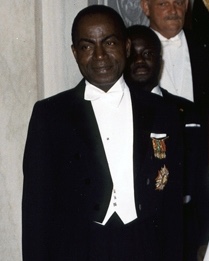
After his resignation, Yaméogo was placed under house arrest. In 1967, he was put on trial for his actions while in power. His son, Hermann Yaméogo, tried to launch a coup to free him, but it failed.
In 1969, Yaméogo was sentenced to five years of forced labor and lost all his civil rights. However, President Lamizana pardoned him, and he was set free in August 1970.
During this time, Yaméogo's property was seized, including a palace he had built in his hometown. His wife Nathalie Monaco left him, and he remarried Jeannette Ezona Kansolé.
Later Life and Rehabilitation (1970–1993)
Maurice Yaméogo continued to be involved in politics through his son, Hermann. In 1977, his son created a political party that became the second-largest in the country. In the 1978 presidential elections, a candidate from their party ran but was defeated by Lamizana.
Upper Volta experienced several coups in the 1980s. In 1983, Yaméogo was arrested by the new government led by Thomas Sankara. He was almost executed but was saved by Blaise Compaoré, who suggested he be imprisoned instead. Yaméogo was freed in 1984 and publicly declared his support for Sankara.
After some time, Yaméogo moved to Côte d'Ivoire in 1987. He helped as a go-between for the governments of Burkina Faso and Côte d'Ivoire. In May 1991, Blaise Compaoré, who was now president of Burkina Faso, officially restored Yaméogo's civil rights and returned his property.
In September 1993, Maurice Yaméogo became very ill. He was flown to Paris for treatment but decided to return to Koudougou to spend his last days. He passed away on September 15, 1993, during his flight home. Many important political figures attended his funeral.
Images for kids
See also
 In Spanish: Maurice Yaméogo para niños
In Spanish: Maurice Yaméogo para niños
 | Sharif Bey |
 | Hale Woodruff |
 | Richmond Barthé |
 | Purvis Young |


